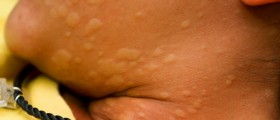
What is chronic idiopathic urticaria?
Chronic urticaria is urticaria that lasts for more than six weeks. Urticaria, a frustrating and annoying, yet harmless condition, is characterized by hives or wheals on the skin, which are edemous pruritic papules. While acute urticaria is, in most cases, caused by an allergic reaction, chronic urticaria, the one that lasts for longer, is rarely or almost never allergic. That particular type of urticaria is called chronic idiopathic urticaria.
Chronic urticaria is much less common than acute urticaria. It is estimated that urticaria affects 15 to 20 percent of the entire population at least once, but the kind that persists daily for at least six weeks is only seen in about one percent of the population.
Even though it is not a dangerous or life-threatening condition, chronic idiopathic urticaria seriously disturbs the quality of life. Constant itching is often very frustrating and makes it very difficult to function normally in social context. It affects the way a person lives the everyday life and performs normal, everyday activities. Work also suffers a lot, and so does the romantic life.
Chronic idiopathic urticaria can affect people of all ages and both sexes, but it is twice more common in women, especially middle-aged.
Treatment for chronic idiopathic urticaria
Chronic idiopathic urticaria continues to puzzle medical professionals, including allergists and dermatologists. The problem is that, being idiopathic, this condition does not have a clear, detectable cause. This makes it almost impossible to pinpoint effective treatment.
Many experts believe that the underlying cause of chronic idiopathic urticaria is an autoimmune disease. Autoimmune diseases are diseases in which the body confuses its own normal elements with foreign, harmful elements, and starts attacking itself. Since regular urticaria is often allergic, and allergies are in fact an immune response, this theory sounds logical. This means that the treatment for chronic idiopathic urticaria should consist of finding the underlying autoimmune disease and treating it.
Many people living with chronic idiopathic urticaria try to eliminate potential allergens from their environment and food. This is actually a difficult and overwhelming task, because there are thousands and thousands of potential allergens around. However, this method seems to help for some patients.
Temporary relief for symptoms of chronic urticaria may come from cool baths, oatmeal wraps and baths, aloe vera, cold compressions and other remedies for cooling and soothing the skin.
Depression is often seen in chronic urticaria sufferers. People who have suffered from this condition for a long time are strongly advised to see a therapist and try to learn how to live with the condition as normally as possible.



-Causes,-Symptoms-And-Diagnosis_f_280x120.jpg)













Your thoughts on this
Loading...